- Home
- Michael Shaara
2066 Election Day
2066 Election Day Read online
Michael Shaara
Michael Shaara (1929-88) was one of the bright young SF writers of the early 1950s, who left the genre in 1957 after producing a number of fine short stories, and later wrote a boxing novel and the Pulitzer Prize-winning American Civil War novel, The Killer Angels (1974). Most of his short stories are collected in Soldier Boy (1982), along with an afterword reminiscing about his early days in science fiction, the excitement of selling to John W. Campbell’s Astounding, the frustrations of dealing with genre markets. Algis Budrys remembers that Robert Sheckley, Michael Shaara and he were the hot new writers of 1952-53.
After the generally positive editorial reaction to Soldier Boy, Shaara completed an SF novel, The Herald (1981 - actually published before the collection, which was delayed, but not published as a genre novel, since Shaara had won the Pulitzer and his publisher was certain that a genre label would compromise his, and their, reputation). The Encyclopedia of Science Fiction praises his writing for its “quick, revelatory ironies about the human condition.” I recall joking with him in 1982 that this, of all his stories, was predictive and that it had already come true. It is still coming true.
* * * *
2066: ELECTION DAY
E
arly that afternoon Professor Larkin crossed the river into Washington, a thing he always did on Election day, and sat for a long while in the Polls. It was still called the Polls, in this year A.D. 2066, although what went on inside bore no relation at all to the elections of primitive American history. The Polls was now a single enormous building which rose out of the green fields where the ancient Pentagon had once stood. There was only one of its kind in Washington, only one Polling Place in each of the forty-eight states, but since few visited the Polls nowadays, no more were needed.
In the lobby of the building, a great hall was reserved for visitors. Here you could sit and watch the many-colored lights dancing and flickering on the huge panels above, listen to the weird but strangely soothing hum and click of the vast central machine. Professor Larkin chose a deep soft chair near the long line of booths and sat down. He sat for a long while smoking his pipe, watching the people go in and out of the booths with strained, anxious looks on their faces.
Professor Larkin was a lean, boyish-faced man in his late forties. With the pipe in his hand he looked much more serious and sedate than he normally felt, and it often bothered him that people were able to guess his profession almost instantly. He had a vague idea that it was not becoming to look like a college professor, and he often tried to change his appearance - a loud tie here, a sport coat there - but it never seemed to make any difference. He remained what he was easily identifiable, Professor Harry L. (Lloyd) Larkin, Ph.D., Dean of the Political Science Department at a small but competent college just outside of Washington.
It was his interest in Political Science which drew him regularly to the Polls at every election. Here he could sit and feel the flow of American history in the making, and recognize, as he did now, perennial candidates for the presidency. Smiling, he watched a little old lady dressed in pink, very tiny and very fussy, flit doggedly from booth to booth. Evidently her test marks had not been very good. She was clutching her papers tightly in a black-gloved hand, and there was a look of prim irritation on her face. But she knew how to run this country, by George, and one of these days she would be President. Harry Larkin chuckled.
But it did prove one thing. The great American dream was still intact. The tests were open to all. And anyone could still grow up to be President of the United States.
Sitting back in his chair, Harry Larkin remembered his own childhood, how the great battle had started. There were examinations for everything in those days - you could not get a job streetcleaning without taking a civil-service examination - but public office needed no qualification at all. And first the psychologists, then the newspapers, had begun calling it a national disgrace. And, considering the caliber of some of the men who went into public office, it was a national disgrace. But then psychological testing came of age, really became an exact science, so that it was possible to test a man thoroughly - his knowledge, his potential, his personality. And from there it was a short but bitterly fought step to - SAM.
* * * *
SAM. UNCLE SAM, as he had been called originally, the last and greatest of all electronic brains. Harry Larkin peered up in unabashed awe at the vast battery of lights which flickered above him. He knew that there was more to SAM than just this building, more than all the other forty-eight buildings put together, that SAM was actually an incredibly enormous network of electronic cells which had its heart in no one place, but its arms in all. It was an unbelievably complex analytical computer which judged a candidate far more harshly and thoroughly than the American public could ever have judged him. And crammed in its miles of memory banks lay almost every bit of knowledge mankind had yet discovered. It was frightening, many thought of it as a monster, but Harry Larkin was un-worried.
The thirty years since the introduction of SAM had been thirty of America’s happiest years. In a world torn by continual war and unrest, by dictators, puppet governments, the entire world had come to know and respect the American President for what he was: the best possible man for the job. And there was no doubt that he was the best. He had competed for the job in fair examination against the cream of the country. He had to be a truly remarkable man to come out on top.
The day was long since past when just any man could handle the presidency. A full century before men had begun dying in office, cut down in their prime by the enormous pressures of the job. And that was a hundred years ago. Now the job had become infinitely more complex, and even now President Creighton lay on his bed in the White House, recovering from a stroke, an old, old man after one term of office.
Harry Larkin shuddered to think what might have happened had America not adopted the system of “the best qualified man.” All over the world this afternoon men waited for word from America, the calm and trustworthy words of the new President, for there had been no leader in America since President Creighton’s stroke. His words would mean more to the people, embroiled as they were in another great crisis, than the words of their own leaders. The leaders of other countries fought for power, bought it, stole it, only rarely earned it. But the American President was known the world over for his honesty, his intelligence, his desire for peace. Had he not those qualities, “old UNCLE SAM” would never have elected him.
Eventually, the afternoon nearly over, Harry Larkin rose to leave. By this time the President was probably already elected. Tomorrow the world would return to peace. Harry Larkin paused in the door once before he left, listened to the reassuring hum from the great machine. Then he went quietly home, walking quickly and briskly toward the most enormous fate on Earth.
* * * *
“My name is Reddington. You know me?”
Harry Larkin smiled uncertainly into the phone.
“Why… yes, I believe so. You are, if I’m not mistaken, general director of the Bureau of Elections.”
“Correct,” the voice went on quickly, crackling in the receiver, “and you are supposed to be an authority on Political Science, right?”
“Supposed to be?” Larkin bridled. “Well, it’s distinctly possible that I - ”
“All right, all right,” Reddington blurted. “No time for politeness. Listen, Larkin, this is a matter of urgent national security. There will be a car at your door - probably be there when you put this phone down. I want you to get into it and hop on over here. I can’t explain further. I know your devotion to the country, and if it wasn’t for that I would not have called you. But don’t ask questions. Just come. No time. Good-bye.”
There was a click. Harry Larkin stood hold
ing the phone for a long shocked moment, then he heard a pounding at the door. The housekeeper was out, but he waited automatically before going to answer it. He didn’t like to be rushed, and he was confused. Urgent national security? Now what in blazes -
The man at the door was an Army major. He was accompanied by two young but very large sergeants. They identified Larkin, then escorted him politely but firmly down the steps into a staff car. Larkin could not help feeling abducted, and a completely characteristic rage began to rise in him. But he remembered what Reddington had said about national security and so sat back quietly with nothing more than an occasional grumble.
He was driven back into Washington. They took him downtown to a small but expensive apartment house he could neither identify nor remember, and escorted him briskly into an elevator. When they reached the suite upstairs they opened the door and let him in, but did not follow him. They turned and went quickly away.
Somewhat ruffled, Larkin stood for a long moment in the hall by the hat table, regarding a large rubber plant. There was a long sliding door before him, closed, but he could hear an argument going on behind it. He heard the word “SAM” mentioned many times, and once he heard a clear sentence: “… Government by machine. I will not tolerate it!” Before he had time to hear any more, the doors slid back. A small, square man with graying hair came out to meet him. He recognized the man instantly as Reddington.
“Larkin,” the small man said, “glad you’re here.” The tension on his face showed also in his voice. “That makes all of us. Come in and sit down.” He turned back into the large living room. Larkin followed.
“Sorry to be so abrupt,” Reddington said, “but it was necessary. You will see. Here, let me introduce you around.”
Larkin stopped in involuntary awe. He was used to the sight of important men, but not so many at one time, and never so close. There was Secretary Kell, of Agriculture; Wachsmuth, of Commerce; General Vines, Chief of Staff; and a battery of others so imposing that Larkin found his mouth hanging embarrassingly open. He closed it immediately.
Reddington introduced him. The men nodded one by one, but they were all deathly serious, their faces drawn, and there was now no conversation. Reddington waxed him to a chair. Most of the others were standing, but Larkin sat.
Reddington sat directly facing him. There was a long moment of silence during which Larkin realized that he was being searchingly examined. He flushed, but sat calmly with his hands folded in his lap. After a while Reddington took a deep breath.
“Dr. Larkin,” he said slowly, “what I am about to say to you will die with you. There must be no question of that. We cannot afford to have any word of this meeting, any word at all, reach anyone not in this room. This includes your immediate relatives, your friends, anyone - anyone at all. Before we continue, let me impress you with that fact. This is a matter of the gravest national security. Will you keep what is said here in confidence?”
“If the national interests - ” Larkin began, then he said abruptly, “of course.”
Reddington smiled slightly.
“Good. I believe you. I might add that just the fact of your being here, Doctor, means that you have already passed the point of no return… well, no matter. There is no time. I’ll get to the point.”
He stopped, looking around the room. Some of the other men were standing and now began to move in closer. Larkin felt increasingly nervous, but the magnitude of the event was too great for him to feel any worry. He gazed intently at Reddington.
“The Polls close tonight at eight o’clock.” Reddington glanced at his watch. “It is now six-eighteen. I must be brief. Doctor, do you remember the prime directive that we gave to SAM when he was first built?”
“I think so,” said Larkin slowly.
“Good. You remember then that there was one main order. SAM was directed to elect, quote, the best qualified man. unquote. Regardless of any and all circumstances, religion, race, so on. The orders were clear - the best qualified man. The phrase has become world famous. But unfortunately” - he glanced up briefly at the men surrounding him - ”the order was a mistake. Just whose mistake does not matter. I think perhaps the fault lies with all of us, but - it doesn’t matter. What matters is this: SAM will not elect a president.”
Larkin struggled to understand. Reddington leaned forward in his chair.
“Now follow me closely. We learned this only late this afternoon. We are always aware, as you no doubt know, of the relatively few people in this country who have a chance for the presidency. We know not only because they are studying for it, but because such men as these are marked from their childhood to be outstanding. We keep close watch on them, even to assigning the Secret Service to protect them from possible harm. There are only a yery few. During this last election we could not find more than fifty. All of those people took the tests this morning. None of them passed.”
He paused, waiting for Larkin’s reaction. Larkin made no move.
“You begin to see what I’m getting at? There is no qualified man.”
Larkin’s eyes widened. He sat bolt upright.
“Now it hits you. If none of those people this morning passed, there is no chance at all for any of the others tonight. What is left now is simply crackpots and malcontents. They are privileged to take the tests, but it means nothing. SAM is not going to select anybody. Because sometime during the last four years the presidency passed the final limit, the ultimate end of man’s capabilities, and with scientific certainty we know that there is probably no man alive who is, according to SAM’s directive, qualified.”
“But,” Larkin interrupted, “I’m not quite sure I follow. Doesn’t the phrase ‘elect the best qualified man’ mean that we can at least take the best we’ve got?”
Reddington smiled wanly and shook his head.
“No. And that was our mistake. It was quite probably a psychological block, but none of us ever considered the possibility of the job surpassing human ability. Not then, thirty years ago. And we also never seemed to remember that SAM is, after all, only a machine. He takes the words to mean exactly what they say: Elect the best, comma, qualified, comma, man. But do you see, if there is no qualified man, SAM cannot possibly elect the best. So SAM will elect no one at all. Tomorrow this country will be without a president. And the result of that, more than likely, will mean a general war.”
Larkin understood. He sat frozen in his chair.
“So you see our position,” Reddington went on wearily. “There’s nothing we can do. Reelecting President Creighton is out of the question. His stroke was permanent, he may not last the week. And there is no possibility of tampering with SAM, to change the directive. Because, as you know, SAM is foolproof, had to be. The circuits extend through all forty-eight states. To alter the machine at all requires clearing through all forty-eight entrances. We can’t do that. For one thing, we haven’t time. For another, we can’t risk letting the world know there is no qualified man.
“For a while this afternoon, you can understand, we were stumped. What could we do? There was only one answer, we may come back to it yet. Give the presidency itself to SAM - ”
A man from across the room, whom Larkin did not recognize, broke in angrily.
“Now Reddington, I told you, that is government by machine! And I will not stand - ”
“What else can you do!” Reddington whirled, his eyes flashing, his tension exploding now into rage. “Who else knows all the answers? Who else can compute in two seconds the tax rate for Mississippi, the parity levels for wheat, the probable odds on a military engagement? Who else but SAM! And why didn’t we do it long ago, just feed the problems to him, SAM, and not go on killing man after man, great men, decent men like poor Jim Creighton, who’s on his back now and dying because people like you - ” He broke off suddenly and bowed his head. The room was still. No one looked at Reddington. After a moment he shook his head. His voice, when he spoke, was husky.
“Gentlemen, I’m sorry. This leads
nowhere.” He turned back to Larkin.
Larkin had begun to feel the pressure. But the presence of these men, of Reddington’s obvious profound sincerity, reassured him. Creighton had been a great president; he had surrounded himself with some of the finest men in the country. Larkin felt a surge of hope that such men as these were available for one of the most critical hours in American history. For critical it was, and Larkin knew as clearly as anyone there what the absence of a president in the morning - no deep reassurance, no words of hope - would mean, he sat waiting for Reddington to continue.
“Well, we have a plan. It may work, it may not. We may all be shot. But this is where you come in. I hope for all our sakes you’re up to it.”
Larkin waited.
“The plan,” Reddington went on, slowly, carefully, “is this. SAM has one defect. We can’t tamper with it. But we can fool it. Because when the brain tests a man, it does not at the same time identify him. We do the identifying ourselves. So if a man named Joe Smith takes the personality tests and another man also named Joe Smith takes the Political Science tests, the machine has no way of telling them apart. Unless our guards supply the difference, SAM will mark up the results of both tests to one Joe Smith. We can clear the guards, no problem there. The first problem was to find the eight men to take the eight tests.”

 The Killer Angels: The Classic Novel of the Civil War
The Killer Angels: The Classic Novel of the Civil War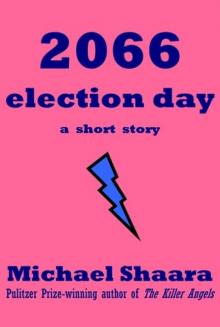 2066 Election Day
2066 Election Day For Love of the Game
For Love of the Game The Book
The Book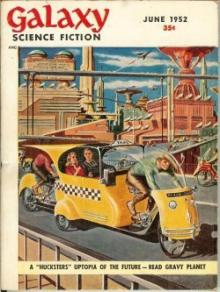 Galaxy
Galaxy Conquest Over Time
Conquest Over Time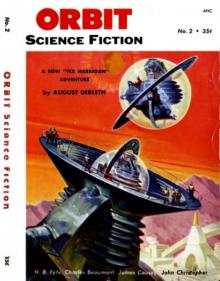 Potential Enemy
Potential Enemy Soldier Boy
Soldier Boy Wainer
Wainer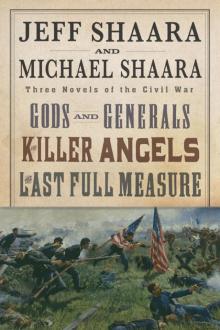 The Civil War Trilogy: Gods and Generals / the Killer Angels / the Last Full Measure
The Civil War Trilogy: Gods and Generals / the Killer Angels / the Last Full Measure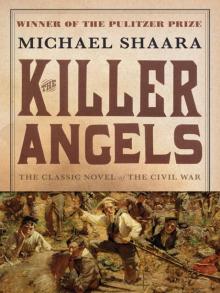 The Killer Angels
The Killer Angels